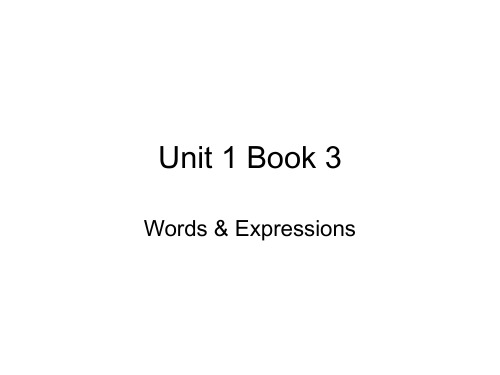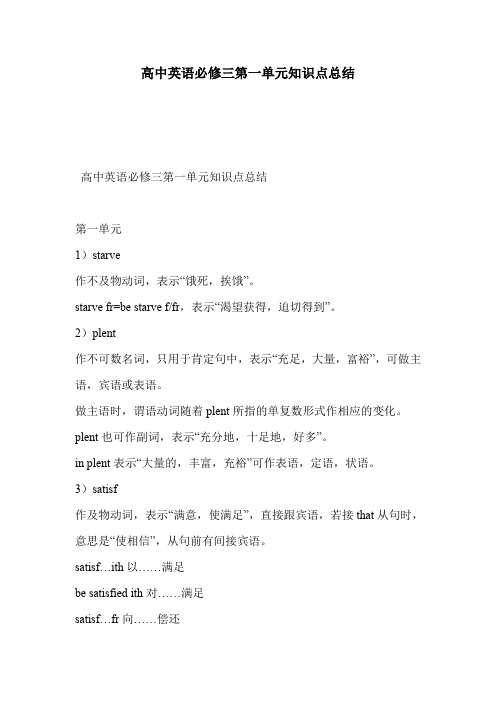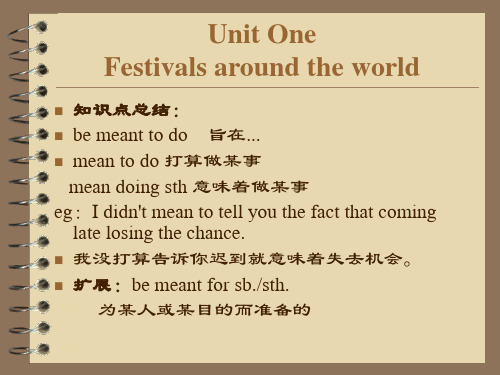必修三 U1 语法点 - 中
必修三unit1语法共24页文档

谢谢你的阅读
❖ 知识就是财富 ❖ 丰富你的人生
71、既然我已经踏上这条道路,那么,任何东西都不应妨碍我沿着这条路走下去。——康德 72、家庭成为快乐的种子在外也不致成为障碍物但在旅行之际却是夜间的伴侣。——西塞罗 73、坚持意志伟大的事业需要始终不渝的精神。——伏尔泰 74、路漫漫其修道远,吾将上下而求索。——屈原 75、内外相应,言行相称。——韩非
必修三unit1语法
21、没有人陪你走一辈子,所以你要 适应孤 独,没 有人会 帮你一 辈子, 所以你 要奋斗 一生。Байду номын сангаас22、当眼泪流尽的时候,留下的应该 是坚强 。 23、要改变命运,首先改变自己。
24、勇气很有理由被当作人类德性之 首,因 为这种 德性保 证了所 有其余 的德性 。--温 斯顿. 丘吉尔 。 25、梯子的梯阶从来不是用来搁脚的 ,它只 是让人 们的脚 放上一 段时间 ,以便 让别一 只脚能 够再往 上登。
人教课标版高中英语必修3Unit1_单元语法详解

Unit1 单元语法详解情态动词(I)情态动词的基本用法情态动词本身有一定的词义,表示说话人的情绪、态度或语气,但不能单独作谓语,只能和其他动词原形构成谓语。
情态动词用在行为动词前,表示说话人对这一动作或状态的看法或主观设想。
情态动词虽然数量不多,但用途广泛。
1. may/might(1)表示许可或征询对方意见,意为“可以”,主要用于肯定句和疑问句中。
might比may的语气更委婉。
You may park here. 你可以在这里停车。
May I speak to you? 我可以跟你说话吗?(2)may可以放在句首,表示祝愿。
固定句型为“May+主语+do”。
May you succeed! 祝你成功!May you both be happy! 祝你们二位幸福!(3)表可能性,意为“也许”,常用于肯定句(might可能性最小)。
He may refuse to speak to you, because he’s in a bad mood.他可能会拒绝和你说话,因为他的情绪不好。
例1单句填空No matter how late it ( be),she will wait for her son to have dinner together.解析:考查情态动词。
句意:不管多么晚,她都要等儿子一起吃晚饭。
根据语境可知,此处may在让步状语从句中,表示一种可能性。
答案:may be2. can/could(1)表示具备某种能力,常译作“能”、“会”。
could主要指过去能做。
Can you play the piano? 你会弹钢琴吗?He could speak English when he was a child.当他是个孩子的时候他就会说英语。
(2)表示提出请求或征求许可。
could用于疑问句中表示委婉语气,但不用于答语中。
Can/Could I smoke here? 我可以在这里吸烟吗?(3 ) can可用于肯定句中,表示常有的行为和情形,意为“有时会,时而可能”。
人教版高中英语必修三语法总结

人教版高中英语必修三语法总结高中英语必修三语法主要考点有情态动词、名词性从句、同位语从句等,下面是具体的高中英语必修三语法,仅供参考。
1英语必修三有哪些语法要学考点一情态动词(unit1,unit2)一、情态动词的特点:1.没有人称和数的变化。
2.有些情态动词有过去式的变化:e.g.will→would,can→could,may→might,dare→dared二、情态动词的否定式:情态动词+not+动词原形cannot:can’t,mustnot:mustn’t,neednot:needn’t三、情态动词的用法及相互区别,是考试的内容之一1.can,beabletobeableto表示经过努力后,能够做到;beableto有多种形式的变化。
can1).表示体力或脑力方面的能力;2).表示允许、可能性。
could是can的过去式,表示过去有能力及过去存在的可能性;用于疑问句表示委婉地提出问题。
1)Thefirespreadthroughthehotelveryquicklybuteveryone____getout.(NMET97)A.hadtoB.wouldC.couldD.wasableto2)-Willyoustayforlunch?-Sorry,__.Mybrotheriscomingtoseeme.(NMET99)A.Imustn’tB.Ican’tC.Ineedn’tD.Iwon’t2.may表示询问或说明一件事可不可做;表示某事有可能发生。
might是may的过去式;用在疑问中比may委婉、客气。
1)-MayItakethisbookoutofthereading-room?-No,youmustn’t.(Yes,youmay.)2)-MightImakeasuggestion?-Yes,youmay.3.must1).表示必须要做的事:必须2)表示很有把握的推断:一定,准是。
have(has)to:have(has)gotto必须,不得不。
高一英语必修三第一单元语法点+例句 实验中学

• .honour
• 1) (n)光荣,荣誉 They fight for the honour of the country.
• 2) an hounour 光荣的人或事情Liu Xiang is an honour to our country.
• 3) (v)尊敬,给以荣誉 Children should honour their parents.
• .look forward to 盼望 • 可以加名词,如果加动词,要用现在分词
形式
• They are looking forward to her visit.
• We are looking forward to _______(see) you soon.
• The day we are looking forward to _____ at last.
• do harm to sb.=do sb. harm=harm sb.伤 害某人
• do more harm than good 弊大于利 • ①Smoking will do you harm.
• = Smoking will do harm to you. • ②If we solve the problem in this way, it
• The young mother is dressing up her little baby. • 他穿着黑色衣服He is _________ in black • 2. 装扮,打扮
• She likes to dress up
• Shall we dress up and attend the wedding?
• lead…to领往;使得出(结论) • lead to通向;引起,导致 • ①请把客人领到会客室去。 • Please lead the guests to the reception-room. • ②你是如何得出这个结论的? • What led you to this conclusion? • ③条条道路通罗马。 • All roads lead to Rome. • ④食用过多的糖会引起健康问题。 • Eating too much sugar can lead to health problems.
必修三unit1重点短语及句式

必修3 Unit1 Festivals around the world 语言点1.(1)take place : 发生,举行(按意图,计划,发生)(2)happen: 发生(意外和偶然性)(3)occur : 发生,突然想起(意外和预料中)句型:sth occurs to sb= it occurs to sb that 某人突然想起某事(4)break out : 爆发,发生(战争,灾害,争吵,争论)(5)come about : 发生(指事情已经发生了,但还不知道为什么. 解释或说明事情的缘由,常与how 连用用于疑问或否定句)2.(1)in memory of 纪念(2) in place of 代替(3) in search of 寻找(4) in charge of 负责,管理(5) in favor of 支持(6) in face of 面对(7) in the hope of 怀着....的希望(8) in control of 控制(9) in praise of 歌颂(10) in possession of 拥有(11)in honor of 纪念,对...表敬意3.(1) dress up 盛装,打扮,掩饰(2) dress sb /oneself给某人/自己穿衣服(3)be dressed in 穿着... wear+衣服be on+衣服put on+衣服4. (1) play a trick on =play tricks on 搞恶作剧,开玩笑,戏弄某人(2) play a joke on =play jokes on 开玩笑,戏弄某人(3) make a joke 讲笑话(4) have a joke with sb 和某人开玩笑(5) make fun of sb 取笑,嘲笑某人(6) laugh at sb嘲笑某人(7) make a fool of sb 愚弄某人5. 词语辨析:(1)gain 获得,得到(好处,利益,经验)(2)win 赢(比赛,战争,人)(3) earn 挣,赚(金钱,荣誉)(1)gather :将分散的集中在一起(2) collect : 有计划,选择地精心收集(1)award 指正式地或官方地颁发,授予,给予。
高中英语必修三第一单元知识点总结

高中英语必修三第一单元知识点总结高中英语必修三第一单元知识点总结第一单元1)starve作不及物动词,表示“饿死,挨饿”。
starve fr=be starve f/fr,表示“渴望获得,迫切得到”。
2)plent作不可数名词,只用于肯定句中,表示“充足,大量,富裕”,可做主语,宾语或表语。
做主语时,谓语动词随着plent所指的单复数形式作相应的变化。
plent也可作副词,表示“充分地,十足地,好多”。
in plent表示“大量的,丰富,充裕”可作表语,定语,状语。
3)satisf作及物动词,表示“满意,使满足”,直接跟宾语,若接that从句时,意思是“使相信”,从句前有间接宾语。
satisf…ith以……满足be satisfied ith对……满足satisf…fr向……偿还be satisfied t d sth满足于做某事4)har作名词,意为“损害”,不与不定冠词连用,常与d,e,ean等动词搭配。
d re har than gd弊大于利There’s n har in(sb’s)ding sth=It des n har fr sb t d sth做某事无害处作及物动词,表示“损害,伤害”。
)lead作及物动词,表示“领导,引导”其宾语常接介词短语或者副词作宾补。
表示“影响,致使”时,后接介词t,也可以接不定式。
lead sb int使某人陷入某种不良的状态。
lead sb aa使盲从,常用于被动语态。
lead nhere毫无结果,,对……不起作用。
lead up t sth作为……准备,导致。
lead sb b the nse牵着某人的鼻子,完全操纵某人lead a dg’s life过困难的生活lead sb believe that使某人相信(假的事情或不确切的事情)lead the a带路,带头lead作为名词,give sb a lead给某人做出榜样,提示某人6)rigin是名词,表示“起,起因,出身”。
高一英语必修三unit1知识点

in ....of
in praise of in search of in support of in face of in need of in honour of in charge of in want of in place of in favour of 赞美,歌颂 寻找 支持 面对 需要 为了...表示敬意 负责,掌管 需要 代替 支持,赞同
习题练习
Many Chinese universities provide D scholarships for students___financial aid. A.in favour of B.in honour of C.in face of D.in need of My sister was against my suggestion while A my brother was ___it. A.in favour of B.in memory of C.in honour of D.in search of
turn up
出现,到达, 出现,到达,露面 eg:他在最后一刻终于出现了。 He turned up at the last moment. 发现, 发现,找到 挖掘 开大一点; 把...开大一点;增强力量、声音等 开大一点 增强力量、
turn扩展词组: 扩展词组: 扩展词组
turn about turn away turn down turn off turn over turn to turn against turn back turn in turn on turn out 转向一头,回头 解雇 关小,拒绝 关掉,转弯 翻转 求助于,转向 背叛 原路返回 上交,告发 打开 证明是
练习题
C Father ____goes to the gym with us although he dislikes going there. A.hardly B.seldom C.sometimes D.never
新教材人教版高中英语选择性必修第三册全册重点语法汇总

人教版选择性必修第三册重点语法汇总Unit 1 Art (1)Unit 2 Healthy Lifestyle (4)Unit 3 Environmental Protection (7)Unit 4 Adversity And Courage (15)Unit 5 Poems (18)Unit 1 Art不定式作表语【观察例句】1.Perhaps the best way to understand Western art is to look at the development of Western painting over the centuries.2.During the Middle Ages,the purpose of Western art was to teach people about Christianity.3.In this work,Monet's aim was to convey the light and movement in the scene.4.What they attempted to do was no longer show reality,but instead to ask the question,“What is art?”【归纳用法】一、不定式作表语的用法1.表目的The purpose of education is to develop a fine personality in children.教育的目的是发展儿童完美的品格。
2.表示事态发展的结果、预期的结果、不幸的命运或语言。
You must speak out,if we are to remain friends.如果我们还想继续做朋友的话,你就必须痛痛快快地把话都说出来。
3.用于第一人称问句,表示征求意见。
What am I to say if they ask me the question?要是他们问我这个问题,我该怎么回答呢?4.表示“同意、安排、命令、决定、劝告、意愿、禁止”等。
- 1、下载文档前请自行甄别文档内容的完整性,平台不提供额外的编辑、内容补充、找答案等附加服务。
- 2、"仅部分预览"的文档,不可在线预览部分如存在完整性等问题,可反馈申请退款(可完整预览的文档不适用该条件!)。
- 3、如文档侵犯您的权益,请联系客服反馈,我们会尽快为您处理(人工客服工作时间:9:00-18:30)。
必修三Unit1 情态动词(一)情态动词梅may---might had better肯can---could be able to莎shall---should ought to used to将will---would would rather do骂死must have to你need爹dare一:情态动词的基本用法1.can、be able to 和could⑴can和be able to都表示能力,意思上没多大区别。
但can只有现在和过去时,而be able to则有更多的形式。
★但当成功地完成某一具体动作时,通常不用could而用was/were able to来表示。
这时was/were able to相当于managed to,表示经过一番努力,终于能够完成某事。
E.g. The wounded man still was able to get to the village and was saved in the end.⑵can和could①.表能力E.g. 1) Some of us can use the computer now, but we couldn’t last year.2) The new-built theatre can seat 1500 people.②. 表示推测,意为“可能”“或许”,用于疑问句或否定句E.g. 1) Can she be in the computer center?2) I thought what he said could not be true.③.表示“请求” “允许”(表请求时,口语中常用could 代替can 使语气更委婉,回答时用can)E.g.1) Can/Could I use your dictionary?2) Could you lend me a hand?④.表示“许可”,可与may 换用。
E.g. You can go home now.⑤. can用于疑问句或否定句中时,表惊异、不相信等,意思是“可能、能够”。
E.g. How can you say that you really understand the whole story if you have covered only part of the article?1. —Will you stay for lunch?—Sorry, ____________. My brother is coming to see me.A.I mustn’tB.I can’tC.I needn’tD.I won’t2. In the coal mine disaster, most of the workers were killed, but John ___have a narrow escape.A.couldB. wouldC. was able toD. can3. Mr. Bush is on time for everything. How ____ it be that he was late for the opening ceremony?A. canB. shouldC. mayD. must2.may/might(1). 表示“许可”或“请求”,有“可以”的意思,口语中常用might 代may , 表示委婉语气。
否定回答时用“must not”表“禁止,阻止”,不用“may not”. “may not” 表示“可能不” 。
E.g.1) --- -May I watch TV after supper?---- Yes, you may. / No, you mustn’t.2) Today is Sunday. She may not in her office now.⑵. 表示可能性。
意为“或许,可能” might 比may可能性小。
E.g. 1) It might be true.2) They may be in the library now.⑶. may/ might as well + 动词原形“…还是…的好” /“不妨”E.g. If that is the case, we may as well try.如果情况确实如此,我们不妨试一试。
⑷. May you +动词原形表“希望、祝愿、祈求” “祝你……”E.g. May you success.1.—Are you coming to Jeff’s party?—I’m not sure. I__________ go to the concert instead.A.mustB.wouldC.shouldD.might2.Sorry I'm late. I _____have turned off the alarm clock and gone back to sleep again.A. mightB. shouldC. canD. will3. will 与would(1). 表“请求、建议”等,用would 比用will 委婉,客气些E.g. 1)Will you lend me your book?2) Would you like a cup of tea?⑵. 用于表示意志或意愿。
will 指现在,而would 指过去。
E.g. 1) I’ll never do tha t again.2) They said that they would help us.⑶.表示习惯性动作。
译作“总是、惯于” will 指现在,would 指过去。
E.g. 1) He will often read all night.2) Fish will die without water.3) Every evening, she would sit by window, deep in thought.⑷. 表示功能,译作“能、行”⑸. 用于否定句中,表示“不肯、不乐意”E.g. No matter what I said, he won’t listen to me.4. should⑴. 用于表劝告、建议。
意为”应该、应当”。
E.g. You should keep your promise.⑵.用于表推测。
意为“可能、该…”E.g. 1) It’s 7 o’clock, he should be at home.2) They should have arrived by now.5. shall⑴shall作为情态动词用于第二,三人称,表示说话人的意愿,有“命令”、“警告、威胁、强制”和“允许”等意思。
E.g.1)You shall get the book tomorrow. 允诺2) He shall be punished. 警告3) You shall go with me. 命令4) If you will come to my house,I will show you my new painting.⑵在疑问句中,shall用于征求对方的意见或请求指示,常用于第一、第三人称。
E.g. Where shall he wait for us?/Shall we go out for a walk?⑶法律文件专用语----- of course.A. willB. shallC. wouldD. Do2.”The interest _______ be divided into five parts, according to the agreement made by both sides,” declared the judge.A. mayB. shouldC. mustD. shall6 must⑴. 表示义务或强烈的劝告,意为“必须”“应该”,其否定式表示“不应该”“不许可” “不准”“禁止”。
Eg: 1) You must finish your homework first.2) Children mustn’t speak like that to their parents.⑵. 回答must 所在的一般疑问句时,否定回答用“needn’t” “don’t have to”.Eg: ---Must we finish the work tomorrow?---No, you needn’t/ don’t have to, but you must finish it in three days.⑶. 表推测,用于肯定句,意为“一定”“务必”。
Eg: 1) Betty must be in the next room.2) He must be watering the flowers in his garden.★但当是否定的推测是用can’t ,而不是用mustn’t。
⑷mustn’t 表示禁止做某事。
例如:You mustn’t smoke in the office.--- He ______ some trouble for he looks dull.A. could have had B should have had C can have had D must have had2. -----Do you know where David is? I couldn’t find him anywhere.------Well. He ________have gone far-----his coat’s still here.A. shouldn’tB. mustn’tC. can’tD. wouldn’t7.比较have to和must⑴两词都是'必须'的意思,have to表示客观的需要,must表示说话人主观上的看法,既主观上的必要.E.g. My brother was very ill, so I had to call the doctor in the middle of the night.弟弟病得很厉害,我只得半夜里把医生请来。
(客观上需要做这件事)E.g. He said that they must work hard. 他说他们必须努力工作。
(主观上要做这件事)⑵have to有人称、数、时态的变化,而must只有一种形式。
但must 可用于间接引语中表示过去的必要或义务。
E.g. He had to look after his sister yesterday. 他昨晚只得照顾他姐姐。
⑶否定结构中:don't have to表示"不必",mustn't表示"禁止"。
